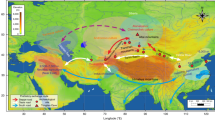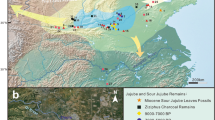Abstract
WHEN the Archaeological Survey of India discovered the layout of a series of houses at Afyeh, Egyptian Nubia, in 1962, some charred cereals were recovered outside one house. At first wheat, barley, lentil, grain, peas and so on were reported. We examined the material later and confirmed the presence of wheat and barley, but did not find lentil, grain or peas, although there were some leguminous seeds that have not been identified so far. Four whole cotton seeds were also identified (Fig. 1) with some fragments.
This is a preview of subscription content, access via your institution
Access options
Subscribe to this journal
Receive 51 print issues and online access
$199.00 per year
only $3.90 per issue
Buy this article
- Purchase on Springer Link
- Instant access to full article PDF
Prices may be subject to local taxes which are calculated during checkout
Similar content being viewed by others
References
Ghosh, A., Indian Archaeology, 1961–62, 66 (1964).
Hutchinson, J. B., The Application of Genetics to Cotton Improvement (Cambridge University Press, 1959).
Hutchinson, J. B., Emp. Cotton Growers Rev., 26, 1 (1949).
Author information
Authors and Affiliations
Rights and permissions
About this article
Cite this article
CHOWDHURY, K., BUTH, G. 4,500 Year Old Seeds suggest that True Cotton is Indigenous to Nubia. Nature 227, 85–86 (1970). https://doi.org/10.1038/227085a0
Received:
Issue Date:
DOI: https://doi.org/10.1038/227085a0
This article is cited by
-
Literatur über archäologische Kulturpflanzenreste (1970/1971)
Die Kulturpflanze (1972)
Comments
By submitting a comment you agree to abide by our Terms and Community Guidelines. If you find something abusive or that does not comply with our terms or guidelines please flag it as inappropriate.



